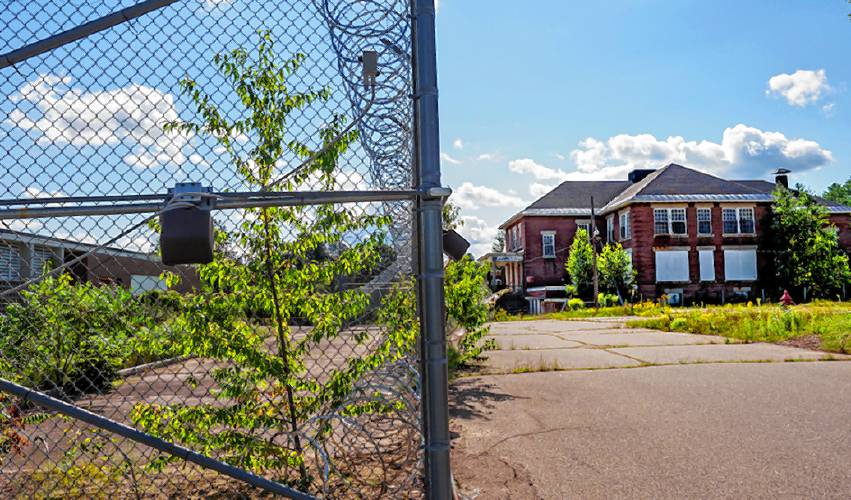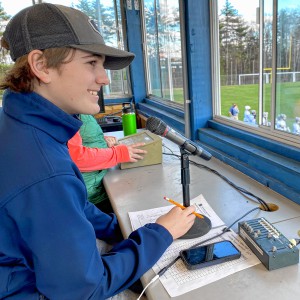No deal. Laconia buyer misses deadline, state is out $21.5 million.

The former Laconia State School property on Aug. 24, 2021. Alan MacRae—New Hampshire Bulletin
| Published: 04-23-2024 10:23 AM |
In 2021, Gov. Chris Sununu rewrote state law to give himself the power to sell the beautiful but problematic 220-acre former Laconia State School campus, saying he’d succeed where others had failed. With just three votes from the Executive Council, Sununu was able to sidestep the typical lengthy state vetting process.
Now Sununu’s plan has stalled, too, but maybe not failed.
The state’s chosen buyer, Robynne Alexander, who offered $21.5 million in cash, missed her Monday deadline to close the deal despite receiving three extensions. However, the group that submitted the next-highest bid after Alexander told the Bulletin Saturday it has let the state know it remains interested in the property.
Department of Administrative Services Commissioner Charlie Arlinghaus said Monday evening the state will “begin aggressively marketing the property” Tuesday morning. It entered into an agreement with Alexander 16 months ago after the Executive Council voted 3-2 in favor of her offer.
Alexander’s failure to close the Laconia deal likely won’t surprise anyone who has followed the Bulletin’s 18-month investigation of Alexander, which found that she’s been sued by multiple investors, is facing her third foreclosure, and has a history of failing to pay property taxes on time.
The latest development came earlier this month when the Bulletin reported that Alexander, of Manchester, was under investigation by the Bureau of Securities Regulation, an agency charged with protecting investors against fraud. Friday, the bureau asked the superior court to force Alexander to comply with a request for six years of business records.
The state wasn’t the only one to lose out Monday. The failed deal has almost certainly cost the city of Laconia more.
Alexander had assured city officials she’d turn the property, which has been in state hands for 100 years, into their greatest dream: A tax-paying mixed-use development with 1,260 housing units, a 250-room hotel, conference center, retail space, medical and child care facilities, and even a public dog park and community garden space.
Article continues after...
Yesterday's Most Read Articles
Laconia Mayor Andrew Hosmer has said the completion of the proposed $500 million “Legacy at Laconia” development would be “transformational” for the city because it so desperately needs housing.
Hosmer said Monday afternoon he was not surprised Alexander didn’t deliver given her real estate problems. But he was disappointed, too, because the city has been trying to work closely with Alexander and her team for two years. He said he hopes the state will vet its next potential buyer.
“It’s been torturous to some extent because what was planned and promised was exciting and would have had a hugely positive impact on the city of Laconia, particularly in respect to the housing,” Hosmer said. “To have it not close after all of these postponements, all the while telling us ‘Don’t worry … we’re going to close’ …, is a cruel joke at the expense of the city of Laconia. It’s a great disappointment but it doesn’t come as a real shock at this point.”
Scott Tranchemontagne, spokesperson for the Laconia project, could not be immediately reached for comment Monday evening.
Hawthorne Development Corp., which offered the state $12.5 million, just over half what Alexander did, would like to pursue options with the state, according to Paul Hodes, a former congressman and member of Shanti Energy, which intended to be a partner.
Their proposal was similar to Alexander’s but would have used solar power and geothermal to produce enough energy for the entire development.
“We believe there is an opportunity to transform the Laconia State School site, with sensitivity to the past and a vision for the future which, when completed, will set an example for enhanced quality of life for the city of Laconia and the project’s occupants through net-zero design, construction and lifestyle,” Hodes said in an email. “We submitted a substantive proposal and a realistic offer in the original round to meet the community’s needs in a professional and timely manner. Our team remains interested and ready to jump in.”
Arlinghaus said he expects the state will require all interested buyers to submit a bid, even if they had done so before.
Should a deal with Hawthorne Development Corp. not materialize, Arlinghaus’ office may have a challenge finding another buyer with a big vision for the site or one willing to pay as much.
When the state first marketed the property, it considered the possibility of getting little to nothing for it because while the site offers sweeping lake views and proximity to ski resorts and golf courses, it also comes with “faults.”
Those include the outdated water and sewer systems that need replacing and the likely demolition of 35 buildings, many of which have been abandoned since 2009. The state received only two other bids in addition to Alexander’s and Hawthorne Development Corp.
One offered $5 million. Two Laconia athletic groups offered nothing and asked instead for help developing the site into a sports complex.
Before Sununu took control of the sale, the legislatively appointed Lakeshore Redevelopment Planning Commission had spent five years pursuing its charge to prepare and sell property.
It spent four years doing a considerable amount of the work necessary to attract a developer with a viable project.
The commission surveyed the property for environmental concerns, mapped the wetlands, assessed the condition of the property’s many buildings, and commissioned a real estate market study. In 2021, Commission Chairman George Bald learned from a reporter that Sununu had taken control of the sale.
Bald said Monday afternoon he was not surprised Alexander failed to close the deal. He said her $21.5 million offer was “way too high” given that the commission estimated it would cost that much just to remove the buildings on the property and put in a new water and sewer system.
“The thing that upsets me is that it’s another two years of deferred property taxes for the city of Laconia,” said Bald. “The city of Laconia has put up with an awful lot, and I really feel bad because I think the state does owe Laconia something. I don’t know what that is … but the sooner it can get redeveloped, it will be for the benefit of the city.”
Developer Steve Duprey was expected to receive about $13 million of the sale for a Concord property the state is currently renting for about $380,000. The rent is set to increase by $200,000 a year in 2027.


 New Hampshire jury finds state liable for abuse at youth detention center and awards victim $38M
New Hampshire jury finds state liable for abuse at youth detention center and awards victim $38M Jurors hear closing arguments in landmark case alleging abuse at New Hampshire youth center
Jurors hear closing arguments in landmark case alleging abuse at New Hampshire youth center Update: Reactions for, against the more than 100 arrested at Dartmouth, UNH
Update: Reactions for, against the more than 100 arrested at Dartmouth, UNH Voice of the Pride: Merrimack Valley sophomore Nick Gelinas never misses a game
Voice of the Pride: Merrimack Valley sophomore Nick Gelinas never misses a game
